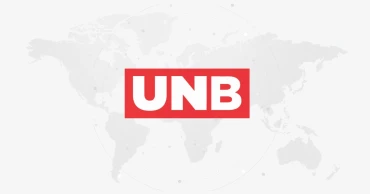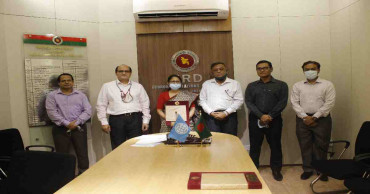climate risk
UNICEF wants investment in world's first child-focused climate risk financing solution
UNICEF is launching a new climate financing initiative to enhance countries' climate resilience and disaster preparedness for children and youth and bolster protection for children from the impacts of future climate-related disasters.
The Today and Tomorrow initiative is an integrated climate change finance solution that, for the first time, combines funding for immediate climate resilience and risk prevention programmes for children today, with innovative use of risk transfer finance provided by the insurance market for cyclone disasters tomorrow.
The combined financing platform is designed to help countries address the current and growing impacts of the climate crisis while preparing for future emergencies and rapidly responding to them when they occur.
“The risks of climate change are no longer hypothetical. They are here. And even while we work to build communities’ resilience against climate disasters, we have to become much better in pre-empting risks for our children,” said Karin Hulshof, UNICEF deputy executive director for Partnerships. “We know more climate disasters are in the making. We just do not know where or when they will hit.”
Children and youth are a critically vulnerable population group that is among the most affected by disaster risk and climate change, including the effects of extreme weather events such as cyclones. Last year, UNICEF’s Children’s Climate Risk Index estimated 400 million children (nearly 1 in 6 children globally) are currently highly exposed to cyclones.
In its initial three-year pilot, UNICEF’s Today and Tomorrow will focus on eight countries in four global cyclone basins – Bangladesh, Comoros, Haiti, Fiji, Madagascar, Mozambique, Solomon Islands, and Vanuatu.
UNICEF is raising $30 million for the initiative and is calling for additional private and public partners to take action and join UNICEF in helping to close the intensifying humanitarian financing gap for disaster protection for children and youth.
Read more: Heatwaves to impact almost every child by 2050: UNICEF report
Climate harm in childhood lasts for life and perpetuates and deepens inequality and poverty across generations. However, the unique needs of children are not directly addressed by existing Risk Transfer mechanisms. This leaves a global humanitarian financing gap, or “Child Protection Gap,” that encompasses hundreds of millions of children and youth.
Cyclones and the disasters they trigger, such as floods and landslides, represent the fastest-growing category of climate-influenced disasters and are a major cause of losses and damages worldwide. UNICEF’s research has shown that investments that reduce exposure to and negative impacts from cyclones and other hazards can considerably reduce overall climate risk for millions of children.
UNICEF’s Today and Tomorrow is the first pre-arranged and event-based climate disaster risk financing mechanism that specifically targets this Child Protection Gap, with full support for the Tomorrow portion of the risk transfer instrument, secured from the German and UK governments under the newly launched G7-V20 Global Shield against Climate Risks.
Read more: Children want govt investment in education, health, protection: UNICEF
3 years ago
WB to provide USD 300 mn for livelihood improvement in Bangladesh
The World Bank will provide USD 300 million to the government of Bangladesh as loan to implement a five-year project on livelihood improvement scheduled to begin from July next.
The government will chip in USD 40 million for the project titled, ‘Resilience, Entrepreneurship and Livelihood Improvement (RELI) Project’, raising its total cost to USD 340 million.
Read: WB approves $191mn credit for Bangladesh’s education sector
The signing ceremony of the Financing Agreement between the Economic Relations Division, Ministry of Finance, and the World Bank; and the Project Agreement between the World Bank and Social Development Foundation (SDF), the implementing agency, was held on June 27 last.
Fatima Yasmin, Secretary of the Economic Relations Division of the Ministry of Finance, and Mercy Miyang Tembon, the World Bank’s Country Director for Bangladesh and Bhutan, signed the Financing Agreement on behalf of their respective sides.
Tembon also inked the Project Agreement on behalf of the World Bank while AZM Sakhawat Hossain, Managing Director of the SDF, signed the per procurationem for the implementing agency. SDF Chairperson Md. Abdus Samad, also a former Senior Secretary, was also present at the signing ceremony, according to a SDF media release.
Built on the success of the first and second Social Investment Programme Projects and the Nuton Jibon Livelihood Improvement Project, the RELI project will mobilize, develop, and strengthen community organizations, and finance their community plans to provide cash transfers and loans for income-generating activities.
Read: Manufacturing sector’s productivity crucial for Bangladesh to offset Covid impacts: WBThe project will provide training to almost 490,000 people on climate risk, adaptation, and resilience building. It will also build 5,120 climate-resilient small-scale infrastructures.“The COVID-19 pandemic has negatively impacted the poor in rural areas, particularly women, by limiting their income and economic opportunities,” said World Bank Country Director for Bangladesh and Bhutan Mercy Tembon.“This project will help boost the rural economy and 90 percent of the beneficiaries will be women. The project will also help with health and nutritional awareness. When a woman earns more, her family and the community are better off,” Mercy Tembon added.The project will support rural entrepreneurs and producer groups with market linkages including e-commerce platforms, partnerships with local governments, and promotional activities, said a WB press release.
Read: Helping poor in Bangladesh: WB approves $600 mn for 2 projectsIt will also provide skills development training to the unemployed or under-employed youth and returnee migrants to increase their employability.Economic Relations Division Secretary Fatima Yasmin said, “Through community mobilization and climate-smart agriculture practices, the project will help rural women withstand any future shocks like the pandemic without falling back to poverty.”
4 years ago



